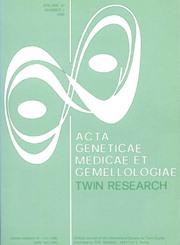No CrossRef data available.
Article contents
Fingernail, as an Alternative Source of DNA for Forensic Investigations and Medical Diagnostics A new technique to obtain template DNA in critical situations
Published online by Cambridge University Press: 01 August 2014
Extract
The use of PCR (polymerase chain reaction) is having a profound impact on forensic science and medical diagnostics.
Limited amounts of biological material and/or degraded low molecular weight DNA can be anticipated for forensic identification and often also for diagnostic investigations in fetuses, stillbirths and children with birth defects.
In vitro amplification of DNA, via PCR, represents an important tool for overcoming some of the limitations. Nevertheless, the problem of availability of biological samples as DNA source is often critic.
In order to obtain a useful and rapid procedure of DNA analysis in such difficult situations, we have recently developed a simple DNA extraction method using Chelex 100 and a PCR based amplification technique, and using fingernail as an alternative source of DNA.
Chelex 100 procedures result in denaturated DNA samples, not suitable for RFLPS analysis. Nevertheless we demonstrated that no differences are detectable between the genotypes obtained by PCR amplification using the conventional phenol-chlorophorm or saline extraction and the Chelex based procedure.
A DNA sample of 3-5 micrograms weight was easily obtained from fingernail clippings, and enabled us to perform several tests by using DNA typing methodologies, both for personal identification (in various forensic, medical and social situations) and in disputed parentage.
Our laboratory uses as polymorphic markers a set of several VNTRs (variable number of tandem repeats) and, more recently, a series of unlinked STRs (short tandem repeats). The use of DNA typing with STR loci provides an accurate, highly sensitive and rapid assay for parentage testing, forensic identification and medical applications.
- Type
- Research Article
- Information
- Acta geneticae medicae et gemellologiae: twin research , Volume 45 , Issue 1-2 , April 1996 , pp. 301 - 302
- Copyright
- Copyright © The International Society for Twin Studies 1996


